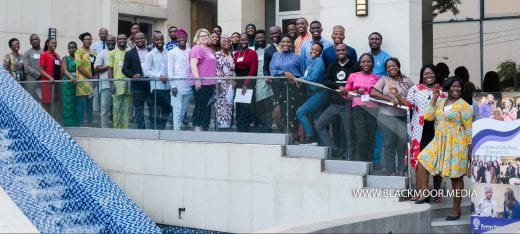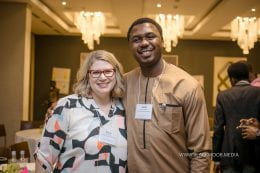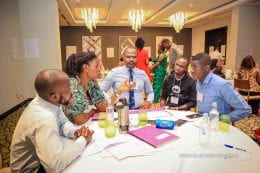In January, the Staley School of Leadership Studies hosted a Leading Change Institute (LCI) in Nigeria, bringing together 33 young leaders of nonprofits and social change organizations serving youth, women, education, health and other advocacy and empowerment efforts. This two-day event utilized an emerging leadership framework called Community-Engaged Leadership as Design (CELD), developed by Onyedikachi Ekwerike (Kachi), doctoral student and graduate teaching assistant, and Kerry Priest Ph.D., associate professor. CELD draws from principles and practices of community-engaged scholarship and design thinking, integrated with practices of adaptive leadership and social change leadership.

Applicants were sought based on their demonstrated work and innovations. And, like other Leading Change Institutes before, the 2020 program in Nigeria was not a forum to present formally about expertise but instead, to engage participants in a dialogue to develop and harness new thinking, generate connection and seed collaboration with other individuals attending from around the world. The LCI format offered an opportunity to leverage and support ongoing work of this selected group of community leaders.
Ekwerike is a nonprofit founder and 2017 Mandela Washington Fellow who witnessed first-hand the leadership challenges facing Nigeria. Over the past three years he has continued to partner with the Staley School, and is currently a graduate student in the Leadership Communication doctoral program.
“As a doctoral student in the Leadership Communication program, I have a unique opportunity to continue working with this group to more deeply understand how they are using the CELD framework.” said Ekwerike. “More importantly, with the support of the Staley School, our goal is to gain a deeper understanding of culturally grounded leadership practices that social change leaders in Nigeria draw on to create change with their communities. This knowledge will enable us make the CELD framework more culturally relevant and heighten its impact as a tool.”
During this two-day gathering, thought leaders engaged in learning through meaningful conversation. They focused on significant issues, and organized their work and goals around common themes.

Eight proposed projects resulted from the Leading Change Institute Nigeria: Engaging in social change lead. Topics varied from maternal mental health to reducing the number of primary school drop-outs through innovative payment options. Through the CELD model, participants developed their plans to begin implementing action quickly in their communities. Less than seven days after the institute ended, one participant, Julius Ilori, emailed that their plan was already in progress and the project was becoming a reality.
“First, I will be organizing a step-down training for my team and we will together work towards implementing the new approach of gathering data with our target community and a creating sustainable solution,” said Ilori.
The Staley School launched the Leading Change Institutes in 2015 to harness creative, collaborative thinking from globally recognized leaders addressing real issues with clear strategies for moving forward. Institutes range in participation from 10 to 40 individuals from applied academic and policy circles in the private and nonprofit sectors. The challenges addressed in the institutes require time to solve, and continued work from the participants.
“The Leading Change Institutes have a history of allowing us to see social change happen in communities,” said Mary Tolar, director of the Staley School. “They create tangible results and make lasting, valuable global impact.”

LCI Nigeria was an opportunity to advance Kansas State University’s land-grant mission, supporting the common good through capacity building, engaged research and civic leadership development locally and globally. The Staley School invites leadership educators and developers to partner with community stakeholders to consider the question, “What kind of leadership is required to make progress on the challenges facing our campus, community or country?” Community engaged methods of development and inquiry offer opportunities for advancing understanding of culturally relevant leadership learning and development of collective, relational and socially-just leadership practice.
“It was an honor to partner with Kachi on this program,” said Priest. “Programs like the LCI demonstrate our commitment to community-engaged scholarship that addresses critical societal issues and contributes to the public good.”
The Staley School will host the next Leading Change Institute during the summer 2020 Mandela Washington Fellowship Program. The Mandela Washington Fellowship for Young African Leaders is a program of the U.S. Department of State with funding provided by the U.S. Government and administered by IREX. Kansas State University is a sub-grantee of IREX and is implementing a U.S.-based Leadership Institute as a part of the Fellowship. For more information about the Mandela Washington Fellowship, please visit the Fellowship’s website.
The LCI format and endowment are leveraged to support the work of the Fellows while at K-State.
View photos from the event on Facebook, and see the video below for a look at participants’ engagement.

Great job
It was a great opportunity for me to be part of this cohort, we are reaping the benefits of the training. We have lunched our Skills Gap Training for fresh graduates as a way of preparing them for future workplace opportunities. We are adopting the technical and adaptive training module learnt.
Thanks to amazing Dr Kerry Priest and Kachi
Lawrence Riches
ED Inspiration Care and Development Center
This is an entirely amazing move. Many thanks to Kachi and Dr Kerry. Nigeria is my country, and I’m excited seeing this great institute coming home.